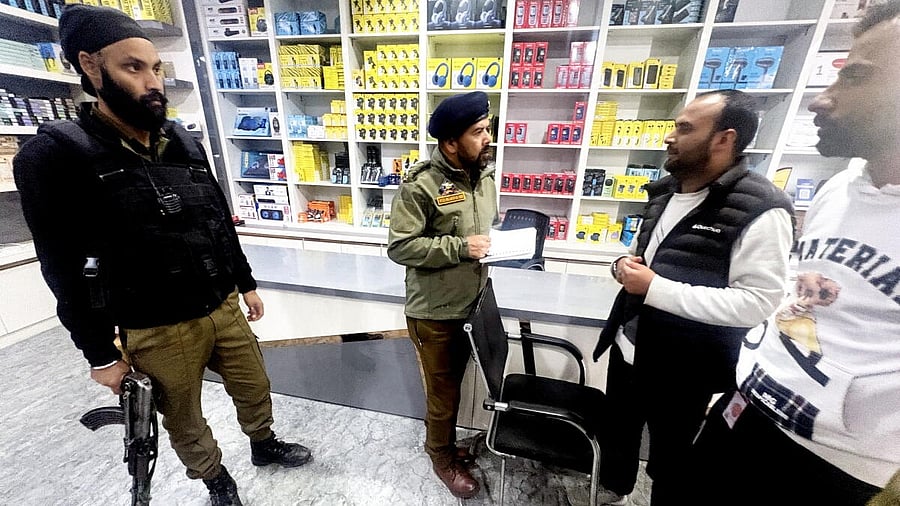
Police personnel during a special inspection of SIM card vendors as part of a crackdown on the illegal issuance of SIM cards, in Anantnag district, Jammu and Kashmir.
Credit: PTI Photo
Srinagar: In a marked departure from the gunfights and cordon operations that once defined counter-insurgency in Kashmir, the Jammu and Kashmir Police are now widening their lens — targeting not just militants, but the ecosystem that sustains them.
From coordinated raids across multiple districts to scrutiny of SIM card vendors and surprise inspections inside jails, the campaign reflects a shift from combat to containment.
Over the past week, police teams have launched a coordinated crackdown on individuals allegedly linked to Pakistan-based terrorists, surrendered militants, and other anti-national elements across multiple locations in Jammu and Kashmir.
“The operations are preventive in nature and are part of ongoing efforts to ensure that anti-national networks do not regroup or operate,” a senior police officer said. “SIM cards issued on fake or manipulated credentials were being used by Pakistan-based handlers and their local overground networks to maintain secure communication channels.”
He said this “network dismantling” strategy is now a core component of the counter-terror grid. “The focus is to break the chain — not only by neutralising militants but by cutting off their support systems, from communication to funding,” the officer said, adding that several telecom vendors are under scanner for violating Know Your Customer (KYC) norms.
Simultaneously, police and intelligence agencies have intensified searches inside jails, particularly in Anantnag, Kupwara, and Baramulla, after inputs suggested that certain inmates were coordinating with operatives outside using smuggled phones and encrypted messaging platforms. The raids led to the recovery of cell phones, SIM cards, and written notes, officials confirmed.
However, human rights activists caution that the widening net of “preventive policing” risks implicating families of former militants or sympathisers. “In many cases, kinship alone becomes a ground for suspicion,” said a Srinagar-based lawyer dealing with multiple UAPA cases.
Security experts, however, back the new approach. “Militancy in Kashmir has morphed — it’s decentralised, digital, and driven remotely,” said Lt Gen (Retd) B S Jaswal, former Northern Army Commander. “Breaking its ecosystem demands an intelligence-led, technology-driven response rather than conventional combat.”
As the Valley witnesses fewer encounters but more surveillance, Kashmir’s new war is being fought quietly — through data, devices, and deterrence — against invisible networks that once thrived on local silence.